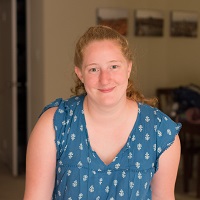I sit before you today asking for your support of Dysautonomia International so that one day, I’ll be able to stand before you.
 When I was 18, my doctor diagnosed me with a debilitating, chronic medical condition called dysautonomia. Currently, there is no cure. Dysautonomia means that my autonomic nervous system doesn’t work. Therefore, my body cannot regulate things like my heart rate, my blood flow, my breathing, or my digestion. This means that every minute of each day, my body is overworking to try to compensate. This leads to symptoms such as fatigue, headaches, nausea, reduced concentration, chest pain, and shortness of breath.
When I was 18, my doctor diagnosed me with a debilitating, chronic medical condition called dysautonomia. Currently, there is no cure. Dysautonomia means that my autonomic nervous system doesn’t work. Therefore, my body cannot regulate things like my heart rate, my blood flow, my breathing, or my digestion. This means that every minute of each day, my body is overworking to try to compensate. This leads to symptoms such as fatigue, headaches, nausea, reduced concentration, chest pain, and shortness of breath.
More importantly, it means that I can’t stand for more than a few minutes without fainting. It means that I need at least 12 hours of sleep each night. It means that I burnout after about two hours of concentration. It means that things you don’t even think about doing are nearly impossible for me. Things like standing in line, showering, running to catch a bus, or walking up stairs.
Dysautonomia means that I will never again be able to attend a standing-room only event. It means that I will never again be able to take a dance class. It means that I will never be able to travel around the world. Or hold a full-time job. Or raise a big family.
Given all this, you may think that the day I learned I have dysautonomia was the worst day of my life. That couldn’t be farther from the truth.
For a time before my diagnosis, I was feeling sick. But no one knew what was wrong with me. Because I couldn’t eat without becoming nauseous, I was 110 pounds. So my doctor was ready to diagnose me with anorexia and refer me to a psychiatric hospital.
I was one of the lucky ones. A week later my doctor diagnosed me correctly and I started to get the care I needed. Plus, in dysautonomia time, a few months before a diagnosis is nothing. My friend Kate received her diagnosis ten years after her symptoms started. Some people never receive a correct diagnosis. I have friends with dysautonomia who received a diagnosis of Munchausen syndrome. Of Histrionic Personality Disorder. Of Bipolar Disorder. Some people are told that they are just making it all up.
None of this would happen if more people, especially health professionals, knew about dysautonomia. That’s why Dysautonomia International exists. Dysautonomia International works to raise awareness of dysautonomia within the medical profession. It provides accurate information to practitioners on the latest diagnostic methods and treatment options available. It also works to increase awareness and recognition of dysautonomia amongst the general public.
In the three years I’ve lived with dysautonomia, I’ve gone to the hospital 7 times. I’ve disclosed my illness to 28 professors. And I’ve shared my story with countless friends and family members. Not one of the doctors in the hospital, or professors at my school, or people in my life had ever heard of dysautonomia before.
Your support of Dysautonomia International means that next doctor that sees a girl with my symptoms will test her for dysautonomia. It means that the dysautonomic high school student needing accommodations won’t be told that their school doesn’t recognize dysautonomia as a valid disability. It means that the government won’t reject the dsyautonomic college graduate for disability aid. It means that one less parent has to fight with their insurance company to get their child’s dysautonomia medicine covered. It means that one day, dysautonomia will be curable.
Give to Dysautonomia International, and one day, I’ll be able to thank you with a standing ovation.
Guest Author, Samantha Steinfeld, 26, wrote this essay for a speech writing class. She was diagnosed with POTS during her freshman year at American University and with the support of her family, friends, and POTS community she was able to graduate from college and now works at a non-profit in Washington, DC. In the fall, she will begin a graduate program in clinical mental health counseling, which she decided to pursue after experiencing first-hand how much mental health services can help teenagers and young adults living with chronic illnesses.
